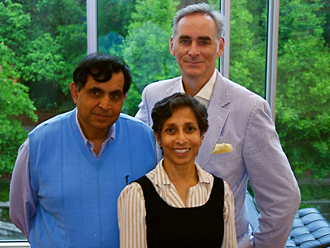Selling consumers on healthy eating
Tulane University School of Medicine has opened up a new front in the battle against obesity and diet-related disease: the kitchen.
The Goldring Center for Culinary Medicine is a groundbreaking program of the medical school that trains future physicians in the fundamentals of food, nutrition and cooking so they can better help their patients make practical dietary changes. The center boasts the world’s first full-time teaching kitchen owned by a medical school, and its curriculum has to date been licensed to a dozen medical schools across the country.

“We’re trying to teach physicians to have a different conversation with their patients about food,” says Dr. Timothy Harlan, executive director of the center, associate clinical professor of medicine and an accomplished chef.
While food and nutrition are the focus, the center also incorporates research from other disciplines, including — perhaps surprisingly — business. For the last several years, Harlan has been working with Harish Sujan and Mita Sujan, marketing professors at the A. B. Freeman School of Business, to use insights from consumer behavior research to help doctors communicate their health recommendations to patients more effectively. Their most recent study investigates how healthy individuals achieve their diet-related goals.
“There’s a lot of research that looks at self-regulation, but researchers have not systematically studied what good self-regulators actually do in life,” says Mita Sujan, the Malcolm S. Woldenberg Chair of Marketing at the Freeman School. “We’re trying to figure out what people who are good self-regulators do to regulate their eating and then build those skills and strategies into the curriculum.”
Last year, Sujan co-authored a study that looked at what successful participants in an exercise program did to achieve their goals. What she discovered was that good self-regulators also tend to be good planners.
“What we show in the paper is that giving people planning aids is really big,” Sujan says of the study, which was published in Journal of Consumer of Psychology. “It really, really drives their ability to self-regulate.”
Sujan says that individuals who have difficulty self-regulating can significantly improve their outcomes by focusing not on distant goals – such as lowering cholesterol or losing weight — but rather on specific short-term strategies. Those tactics include planning ahead (such as packing a lunch instead of dining out), substitution (opting for fresh fruit instead of cake), moderation (ordering a small size instead of a large), restraint (eating only half a dessert or entree), and developing intrinsic interest (resolving to find a recipe to make a better-tasting, healthier dessert).
Instructors at the Goldring Center are already using Sujan’s recommendations in their classes, but Harlan says the long-term goal is to conduct tests to determine which strategies are the most successful. Those strategies can then be formally incorporated into the curriculum to help improve its efficacy.
For Sujan, who has studied the ways consumers make decisions for 30 years, it’s rewarding to see her research being applied so quickly and for such an important purpose.
“I think the academy is changing, especially in marketing, which is such an applied field,” Sujan says. “We’ve moved from lab studies to field studies that tell us what people actually do to make good decisions, and our work with Tim is a great example of that shift.”
Interested in advancing your education and/or career? Learn more about Freeman’s wide range of graduate and undergraduate programs. Find the right program for you.
Recommended Reading
- Pierre Conner: The Future of Energy Is Now
- Claire Senot: Leveraging the Power of Data
- What Can You Do With a Business Analytics Degree?
- Ukrainian scholar to discuss economic impacts of war
- New Orleans startup aims to minimize hospital wait times
- Join the Freeman School for Homecoming 2012
- Burkenroad Symposium tackles ethics of social media
- Burkenroad Symposium to explore ethics and social media
Other Related Articles
- CNN: 3 ways Trump trying to fire Powell could backfire
- Harvard Business Review: 5 Ways Leaders Can Communicate Power
- PsyPost: Scientists show how you’re unknowingly sealing yourself in an information bubble
- Scientific Inquirer: Why Searching for Truth Online Might Be Making Us More Biased
- WDSU: Gas prices face uncertainty after US strikes on Iran
- Freeman announces new administrative appointments
- International MD/MBA class inspires student to volunteer in Guatemala
- CNET: The Scientific Reason Why ChatGPT Leads You Down Rabbit Holes
